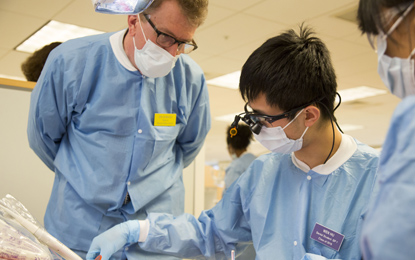 For nearly two decades, the University of Maryland School of Dentistry (UMSOD)’s Advanced Education in General Dentistry (AEGD) clinic has provided affordable treatment to thousands of homeless patients through ongoing grant support from the Maryland Department of Health and Mental Hygiene (DHMD).
For nearly two decades, the University of Maryland School of Dentistry (UMSOD)’s Advanced Education in General Dentistry (AEGD) clinic has provided affordable treatment to thousands of homeless patients through ongoing grant support from the Maryland Department of Health and Mental Hygiene (DHMD).
Now, the AEGD clinic will be able to extend its treatment to Medicare recipients in addition to the uninsured, thanks to a $828,300, five-year grant from the DHMD.
Medicare, an insurance program for Americans aged 65 and older, includes a large number of recipients with unmet oral health needs, according to Douglas Barnes, DDS, professor in the AEGD program. In Maryland, Medicare recipients must purchase separate dental insurance plans through Medicare Advantage, which typically only covers routine care.
For the population of elderly patients who are in assisted living, the problems are often more complex. “For those who are in nursing homes, the teeth often come last,” says Barnes. “This grant will allow us to provide treatment for elderly patients who don’t qualify for public assistance but also don’t have dental insurance.”
Barnes was the principal investigator of the grant. “The definition of who we can treat is expanding,” continued Barnes, “and the elderly will benefit.”
Serving a wider range of patients will also provide additional opportunities for valuable experience for the UMSOD residents and a group of senior dental students who have been named Diamond Scholars, according to Barnes. The Diamond Scholars Program offers the highest-achieving pre-doctoral senior students an opportunity to work alongside AEGD residents to perform more advanced dental treatments.
“Patients in the AEGD clinic have unique challenges that aren’t normally served in pre-doctoral clinic, and the elderly present specific issues in terms of reduced ability to do homecare, complex medical issues and inability to eat due to tooth loss. Working with this population gives our Diamond Scholars the opportunity to develop into excellent, well-rounded clinicians,” says Barnes.



